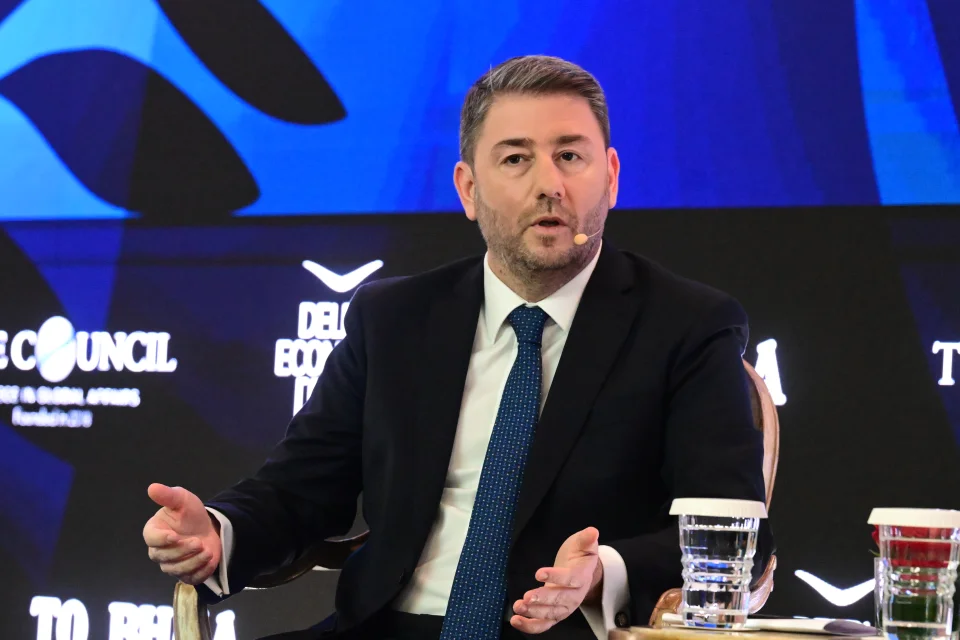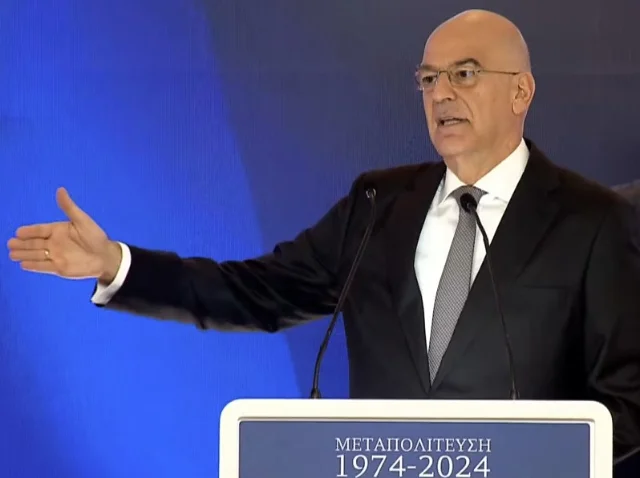Day two of the highly anticipated two-day conference “Metapolitefsi 1974-2024: 50 Years of Greek Foreign Policy” took place on Friday in Athens, with Prime Minister Kyriakos Mitsotakis taking center stage before discussions took place with ex-PM Alexis Tsipras, PASOK president Nikos Androulakis and some of the top analysts in the field.
Defense Minister Nikos Dendias also addressed the conference, taking place in a downtown Athens hotel, and also fielded questions, both over his current portfolio and with his standing as the previous foreign minister.
The event coincides with the 50 years since the restoration of democracy in Greece, an utterly transformative period described in the country with the single word “Metapolitefsi”, which in Greek means “regime change” or “regime transition”.
The milestone event was organized by the newspaper “To Vima”, The Council for International Relations and the Delphi Economic Forum.
In touching on the subject that took up a good portion of the deliberations at the Conference, namely, Greek-Turkish relations and Athens’ position vis-à-vis Ankara’s positions, claims and challenges over the past 50 years but especially over the very recent period, Dendias noted that “we’re talks with Turkey, however, we always cite the unacceptable Turkish positions”.
In taking an account of the wider regional situation at hand, Dendias said “…war has returned to Europe and the world, and Turkey has been veering towards neo-Ottoman models ever since. Indeed, it (Ankara) is slowly expanding its agenda of claims against our country. We must talk with Turkey, but we always bring up the unacceptable aspects of Turkish positions.”
Beyond the focus on Turkey, Dendias reminded that Greece’s political system in the past always found a way to agree on common ground over fundamental parameters of foreign policy, citing the country’s accession to the EU, its membership in NATO, the establishment of relations with the State of Israel, the national position vis-à-vis the breakup of the former Yugoslavia, and, what he called the “biggest triumph” of recent memory in Greek foreign policy: Cyprus’ accession to the European Union.
In mention Turkey in this “bundle”, Dendias also said Athens’ fundamental policy change to support Turkey’s European prospects is also among these successes.
In a question referring to his current portfolio, defense, the Corfu-elected deputy said an “Iron Dome”-type system eyed by the Greek armed forces will focus on being an anti-drone deterrent.
Finally, asked about the Hellenic military’s structure and strategy, Dendias called for a “complete change” in mentality.
“A structure of forces based on a Napoleon-like approach showed us, in Ukraine for instance, that it’s not only yesteryear, but the year before that. There are citizens (in Greece) who say we’re spending too much on defense. However, we must see what the threat is, and what the latter spends on defense, in order to see whether what we’re spending is high or low.”
Androulakis
PASOK-KINAL party leader Nikos Androulakis followed Dendias onto the center-stage for a Q&A session, buoyed by his socialist-cum social democrat party’s recent emergence as the main opposition in Parliament – after more MP defections from leftist party – and his personal victory in again coming first in an internal party election.
In terms of foreign policy in the present day, Androulakis first mentioned the stunning recent developments in Syria and a possible repercussion for Greece.
“If a regime is established in Syria that’s a Turkish satellite, then we may see another Turko-Libyan pact. This will show that time is not working in our favor. We need a comprehensive strategy that seriously assesses the facts of the region, and not to raise the bar too high with goals that can’t be achieved.”
Turning to the conference main subject, he said the period after the restoration of democracy – metapolitefsi – begins with tragedy, i.e. the invasion of Cyprus and the continued one-third of its territory by Turkey, the aggressor.
“…and this required that we be very careful not to make mistakes. Other (Greek) political parties helped more, others less. The most important thing is the Helsinki strategy, which led to Cyprus’ accession to the EU”.

The former MEP then turned to neighboring Turkey, a favorite theme of the Conference, asking rhetorically, “does Turkey have a European prospect? I say this constantly, that this is a farse. There was another procedure in 2004 and another in 2024,” the PASOK president assessed.
He also took a jab at the government and ruling New Democracy (ND) in the wake of former prime minister Antonis Samaras’ expulsion from the latter and his continued criticism of the Mitsotakis government’s stance vis-à-vis Turkey. Samaras has previously even attacked FM George Gerapetritis for “appeasement” in the face of Turkish demands and claims.
“This isn’t the first time ND’s internal issues have translated into foreign policy matters. We should talk with Turkey, but without illusions. Mr. Mitsotakis and Mr. Gerapetritis cultivated high expectations without a corresponding environment,” he said.
Along these lines, he opined that Turkey remains absolutely dependent on the West.
“We must exploit Turkey’s economic needs in relation to EU in order to safeguard the sovereign rights of Greece and Cyprus.”
Shifting gears away from the country’s eastern neighbor, Androulakis was also derisive of the political developments across the Atlantic, calling the Trump victory a “negative development for all of humanity.”
“Imagine if we had a prime minister here who four years previously had planned an attack on Greek Parliament?”
Greece’s role in the west Balkans
In a later discussion session focusing on Greece’s role in the western Balkans, the previously thorny “Macedonia name issue” and Athens’ current relations with the Republic of Macedonia in the wake of the landmark Prespa agreement, Panteion Univesity Prof. Marilena Koppa said “Greece had a unique opportunity in 1989 to act as a bridge to Europe and the (ΕU) Institutions.
“However, what we saw was a Greece that was unprepared, which developed defensive and fearful characteristics, and instead of being a solution to the Balkan issue, it became part of the problem. The Macedonia name issue encapsulates all of the Greek pathogenies of the period. It turned into a chronic problem that was solved in 2018. Was the agreement perfect? No. Achieving 100% of what you want is only possible with war. The brilliance of the Prespa agreement is that it has turned an issue of identity into one of practical terms. The problem is that international agreements have value when they become the possession of the parties, and that’s where the agreement has foundered.”
On his part, Prof. Sotiris Rizas, the head of the Athens Academy’s Research Center for the History of Modern Hellenism, said the Prespa agreement must be considered as valid, regardless of “whether we consider that it is good or bad”.
In reference to Greece’s stance vis-à-vis Kosovo, Rizas said that although “the issue is complex, a recognition by Athens would create more problems than non-recognition. I would say that this is a type of frozen conflict between Serbia and Kosovo that at some point must be resolved.”



